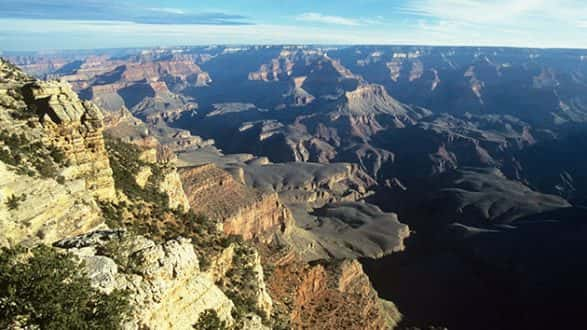
 Moodboard/Getty Images(LOS ANGELES) — Two 18-year-olds from Florida who went hiking in the Grand Canyon as a final summer exploit before heading to college got more of an adventure than they had bargained for.
Moodboard/Getty Images(LOS ANGELES) — Two 18-year-olds from Florida who went hiking in the Grand Canyon as a final summer exploit before heading to college got more of an adventure than they had bargained for.
Lifelong friends Reese McMichael and Rowan Fitch got lost and were not rescued for five days.
The teens lost the trail they intended to take to hike out of the canyon while in a dried riverbed at the bottom of the canyon.
“We couldn’t find it anywhere,” Fitch told ABC News. “So eventually we just started basically trying to free-climb the mesa out of the canyon, and that was just tiring us out and wearing us down. And we realized if we kept doing that, we were just going to get stranded up on the mesa and die of dehydration or something. So we decided to just go back down to the bottom.”
The young men followed the dried riverbed hoping to reach the Colorado River, where they hoped to find a ranger station. But they eventually turned back to a spot where they found a source of fresh water.
“We found a few areas where water would just barely trickle out of the ground,” McMichael said of the area where they lay in the shade to conserve their energy in the heat.
Fitch said they decided to “hunker down by this little source of water near the base of the trail that we had started out originally, and we just waited there for about three or four days and the rangers came and picked us up.”
The pair rationed the little food they had, including small pieces of granola bar.
Eventually, the teens saw a helicopter overhead.
They made a sign with rocks at the base of the trail that pointed to where they were, Fitch said. He started to blow a whistle and wave branches at the helicopter.
“We both felt, like, a tremendous sense of relief,” McMichael said of when the helicopter spotted them.
“I don’t think I could have done it with anyone else but Rowan,” he added. ” … We could get through anything together.”
Park rangers told ABC News that the young men’s experience is a lesson about the risks of relying on a cellphone in a wilderness setting where there may not be reception, adding that it is important for hikers to plan ahead and acquire the necessary apps, maps or trail guides that can help once they are in the park.
“Depending on how bad the service is, the compass should still work, and you know that’s one thing we advise people: to know how that phone works, to know how to get into your compass app and to be able to take a screenshot of the latitude, longitude. If you’re making a call to a rescue service and they ask for that, that’s a great way to find people,” park ranger Mike Alongi said.
Copyright © 2017, ABC Radio. All rights reserved.










